W3Mine is a B2B* blockchain platform for traceability and certification of global mining supply chains.
Our main objective is to support the mining industry by providing tools that demonstrate compliance with social and environmental responsibility, using Distributed Ledger Technology (DLT) and tokenized certification.
This digital tool allows companies in the ecosystem to demonstrate attributes such as environmental sustainability, social responsibility, and regulatory compliance in
their operations.
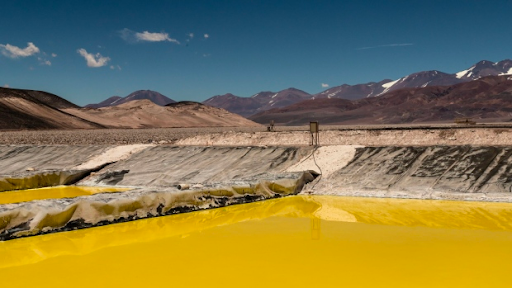
Mining certification

Certify
Positive social & environmental impact of mining investments.

Run up
Traceability in the mining industry.

Increase visibility
Of environmental, social and regulatory compliance on the mining ecosystem.

Web3
Transparency, security and sustainability of the extraction process.

Guarantee
Compliance with international standards through certification.

Reduce Costs
Blockchain and digital integration
What is Web3?
Web3 is a technology that leverages innovative tools to improve processes and interactions, providing transparency, security, trust, automation, and traceability.
Using distributed ledgers, digital assets, tokens, and smart contracts allows for redefining how agents interact with each other, letting trustless parties interact in a safe context with the right incentives, and solving several long-dated problems in different industries.
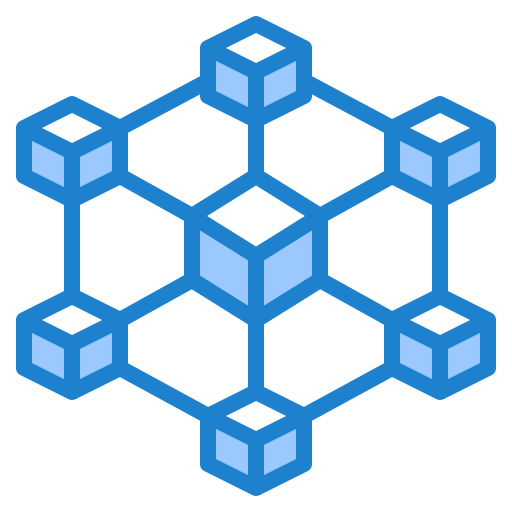
Distributed Ledger Technology (DLT)
Decentralized data ledger that exists across a network of computers
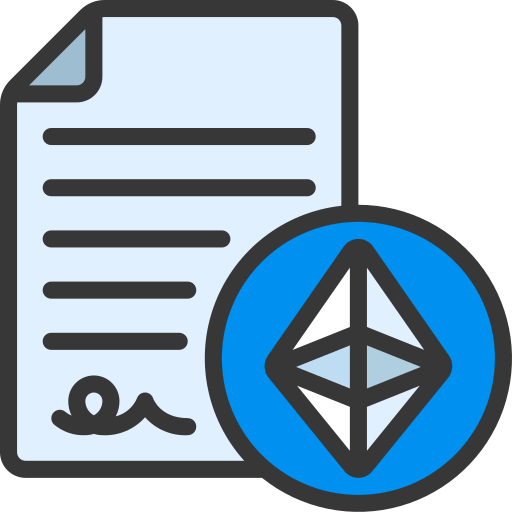
Smart Contracts
Software programs established in immutable code on a DLT automatically executed when specified conditions are met
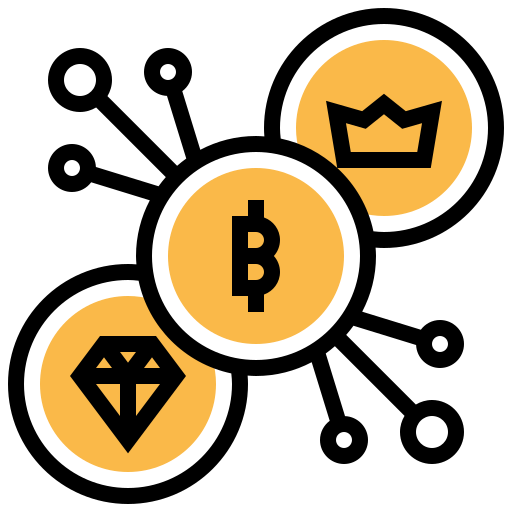
Digital Assets & Tokens
Units of value that represent an asset or provide unique utility within its native blockchain network.
A broad business network of assets and transactions
Base of participants to validate the transactions
Information on which participant has done what and when
Trust in transactions
Complete and single source of truth
What is this tech trend about?
Web2
Centralization where large platforms govern access and own the user data.
Data monetization by tech platforms (e.g., personalized ads, revenue sharing) where user audiences are often the “product” sold to advertisers.
Web3
Disintermediation with a shift toward individual ownership and control over data monetization, functionality, and value.
Revenues are shared back to users and/or capital contributors through Smart Contracts and Decentralized Autonomous Organizations (DAOs).
Developers
Mining Industry
Mining companies essentially base their entire operations on environmental, geological and economic conditions to find out whether the operation is worthwhile in the first place.
Failure to correctly collect and communicate such data can lead to huge losses of capital, or the detriment of health and safety for workers and local communities. Consequently, it is paramount to have the right technology tools to work with. Web3 technologies such as Blockchain provide the right solutions to address these problems.
Blockchain in mining and metals has been mostly associated with tracking and tracing supply chains. It has become increasingly important (and feasible) to credibly demonstrate the provenance of materials. This is in order to ensure minerals are not sourced using child labor, or violating human or environmental regulations.
This is why several companies have implemented blockchain technology in the mining industry: IBM, Rio Tinto, MineHub, BHP, and MKS.


Mining industry Pain Points
Environmental Compliance
The mining process can have a significant impact on the environment. Minimizing the environmental impact of mining operations is a key concern for many companies.
Supply Chain Management
The mining industry relies on complex supply chains, with many stakeholders involved in the process of extracting, processing, and transporting materials.
Cost Efficiency
The cost of mining can be high, with expenses including equipment, labor, and energy. Managing costs effectively is important for profitability.
How W3Mine Works
Traceability in the Mining Industry
Our solution is a B2B blockchain platform for traceability and certification of global mining supply chains. Its main objective is the issue of digital certificates that validate mining industries environmental and social impact metrics. This system is developed within the framework of a tokenized ecosystem using distributed ledger technology (DLTs) and tokenized certificates.
To this end, addresses will be generated on a permissioned blockchain network, which will uniquely represent user profiles participating in the digital ecosystem of the platform. To this end, BID-LAB blockchain network is deployed (LACNet). This tool allows a mining industry to demonstrate compliance with an attribute on the mineral extracted, the process for obtaining it, or its establishment. If compliance is met, a tokenized certificate is issued. Allowed counterparties (a Watcher Agent) may access certificate associated information:
- Data related with the extraction and production of minerals, to know current and projected volume of the mineral that will be exported and on which royalties are paid.
- The faithful compliance with environmental standards,
- The social compliance and positive impact delivered by the mining company.
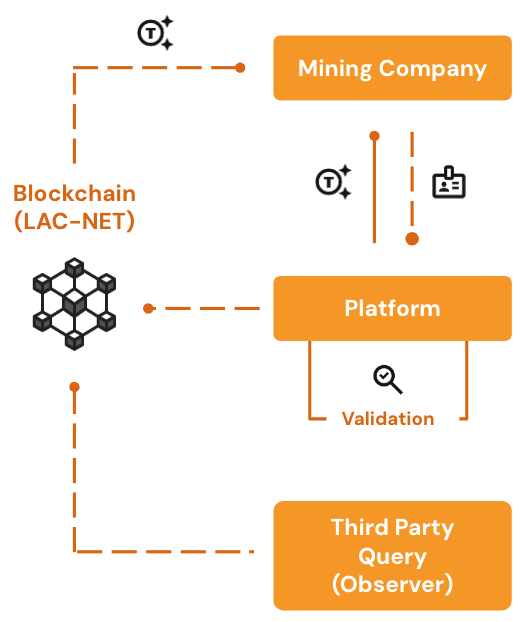

Certificate represented by Non-Fungible Token (NFT)

Platform registration
4 step validation process
The system administrator setup/configures the system based on the current legislation/rules in order to allow the different actors to gather and upload the necessary data/information.
The mining company requests access to the platform and submits all necessary information, including environmental and social practices, exploration permits, project monitoring, and closure certificates.
Our platform allows the mining company to track the status of their request, understanding at what stage of the approval process they are. This improves transparency and reduces uncertainty by giving the mining company clear visibility of their certification progress.
The platform validates submitted data, and verifies if parameters are met. Successful validation triggers the Certificate Minting (NFT) to the mining company.
Once the company obtains the certificate, the platform allows the visualization of certificates both internally and externally. Any Watcher Agent (public entities, service and goods providers, banks, customers of mining companies, community members) can access and validate the compliance of the stated parameters.
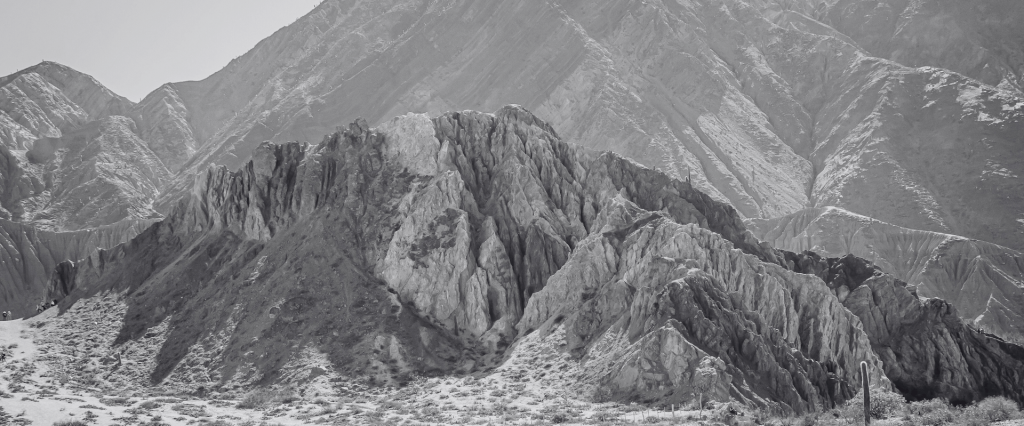
Who we are
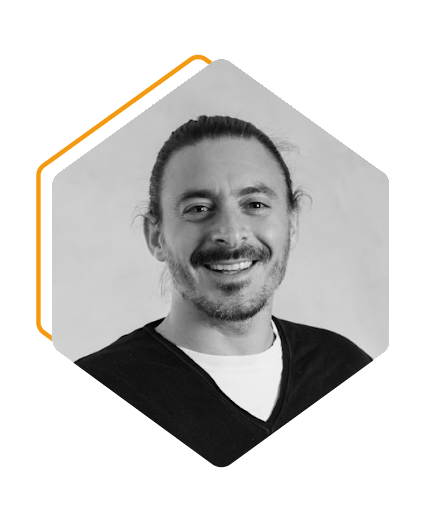
Sebastián Heredia Querro
Sebastián is a lawyer with a master's degree in business law from the Universidad Austral, a diploma in management development (PMD ®), a professional specialization in corporate finance, and another master's degree in finance with a fintech orientation from ESADE (Spain). He co-created five companies with operations in diverse industries and is the author of the book Smart Contracts: What Are They? What Can Be Done with Them and What Cannot Be Done with Them?
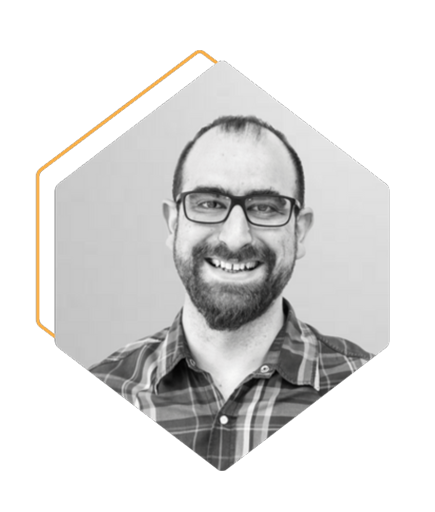
Jorge Atala
As Chief Technology Officer at Wootic, I led product design and delivery, actively involved from ideation to execution. Focusing on best practices and tech, I crafted plans for short to long-term objectives across teams. In providing guidance and fostering collaboration as Chief of Engineering, and as Founder & CTO of SEQUEGENICS, I developed a web-based platform for long-read DNA sequencing with a novel algorithm using PacBio II-generated data.
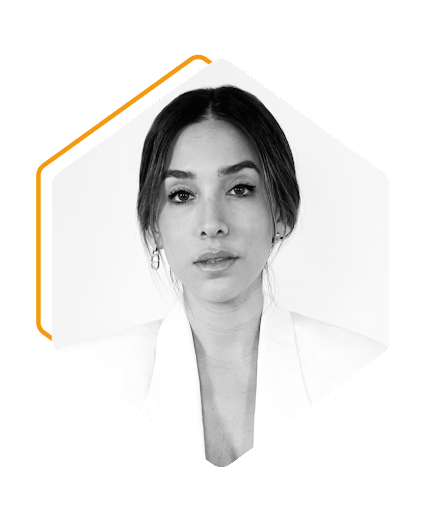
Florencia Sosa
Florencia is CEO of a group of companies. Studied Business and Public Accounting. With a postgraduate degree in Management & Business Intelligence at UB. Master in Finance and a "Women's Leadership Program" at Yale University. Director of the Economic Federation of Catamarca, the first female President of the Chamber of Pharmacies of Catamarca. Florencia is an activist for the rights of women and young people in the business world.

Florencia Bovo
Florencia is a Bachelor of Business Administration and Public Accountant. Master in Digital Business at the University of San Andrés. Since 2015, she has worked in multiple international companies such as EY, Grupo Sancor Seguros and Burger King. Participated in the creation of a digital bank in Argentina in marketing and commercialization. Developed the digital channels at Burger King and the expansion of Domino's Pizza in Uruguay.

Contact
Florencia Bovo
Managing Director
Florencia Sosa
Managing Director
Sebastian Heredia
Managing Director